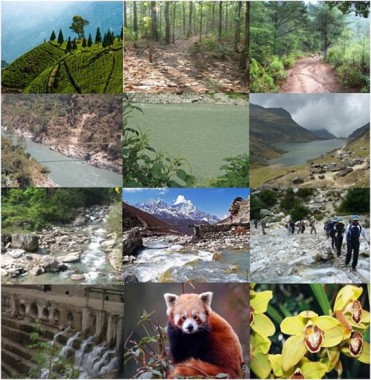




















Sunday, Jan 01, 2023 08:00 [IST]
Last Update: Sunday, Jan 01, 2023 02:35 [IST]
NATURE CONSERVANCY
Sikkim is a state with varied bio-geographical diversity and is rich with different agro-climatic regions from north to south giving rise to unique ecosystems. The state is rich with mineral and forests rich with biodiversity and abundant wildlife. This ecological and environmental wealth of the nation is specific to the region is unique with several rare, vulnerable, endangered, critically endangered and endemic species of flora and fauna that needs from proper survey, official documentation and recording. This is an important initiative of auditing the natural resources of the country since her integration into the Indian union; and warranties careful monitoring and surveillance by the government, non-government agencies working at the ground level as well international agencies funding such important projects. Vast sections of the state needs detailed survey to estimate and document forests, wildlife, biodiversity, minerals, soil types, changes in vegetation pattern, populations, evolution and establishment of various industries and infrastructure. Only with proper scientific documentation it will be possible to make important choices about further economic development of the state of Sikkim.
There are several challenges for the state of Sikkim to protect her natural resources such as susceptibility to natural disasters being located in the young Himalayan fold mountain chain such as earthquake. Furthermore, there are always challenges of poaching, illegal wildlife trade and trafficking in the state due to her close proximity to international borders that make it vulnerable to exploitation by anti-social elements. The population of the state is slowly increasing with time and there are reports of illegal infringements into forested areas for the purpose of human sustenance. Reports of archaic slash and burning as well improper step cultivation methods are a serious threats to her forest resources that includes rare orchids, rhododendrons, conifers, red panda, snow leopards, rare fungi and medicinal plants as well as timbers are becoming common in both government and non-government sources as well as different media outlets. Unless proper survey and monitoring are systematically conducted throughout the state particularly in the areas with rich biodiversity; it may result in the serious erosion of both major and minor state forest and other natural resources in the not so distant future.
Natural resources contribute towards the building the basic socio-economic frameworks of any nation, state, province, territory or union or federation across the planet. Unless the nation is actually aware of the true estimate of these valuable resources; if not possible to take judicious decisions in deciding what resources could be used in the future economic development of the country. It is also important to know which resources are limited or are not easily available or accessible. Then it is easier to make proper long term planning to conserve and protect those natural resources appropriately. The same is true for a state like Sikkim; as several stated make a nation. Modern advanced and industrially developed western nations have invested extensively at one point of time in the detailed survey of the to nations using a viable technology. These has paid back to them significantly in terms of adequate knowledge of their natural resources.
This in turn has helped them to design their future exploitation and conservation of available resources based purely on modern scientific investigations and data collected. These very fundamental approaches has played a very significant role in helping these nations to develop economically and technologically on a sustainable stepwise manner. Bangladesh needs to adopt this model for future socio-economic as well as ecological growth if the nation. I sincerely believe that Sikkim has the capacity and the capability to monitor these projects successfully to establish an even better economically and ecologically sustainable state/region. This can also serve as a global model and inspiration for many developing and under developed countries across Asia, Africa and Latin America. Sikkim has already established herself as the first true organic state or region across the entire planet. It is therefore at this time it is necessary for the state of Sikkim to move forward towards proper survey, auditing, monitoring and surveillance of her unique natural resources, biodiversity, wildlife, various agro-ecosystems, forests and mineral resources. Sikkim is a global leader and will be recognized again as a state with difference and make everyone proud.
